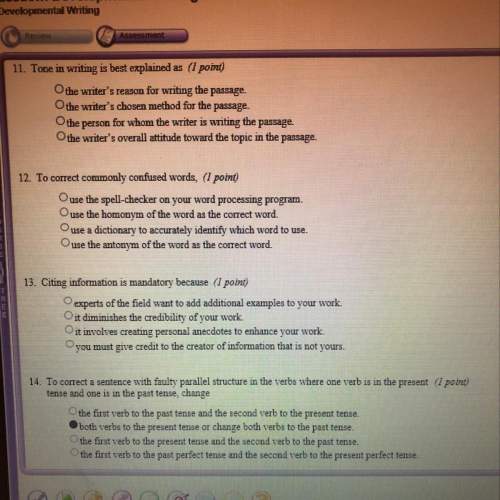
English, 25.03.2020 19:02 kberly3750ovgw6f
Question 13(Multiple Choice Worth 5 points)
(MC)
Memories of a Memory
Have you ever witnessed something amazing, shocking or surprising and found when describing the event that your story seems to change the more you tell it? Have you ever experienced a time when you couldn't really describe something you saw in a way that others could understand? If so, you may understand why some experts think eyewitness testimony is unreliable as evidence in scientific inquiries and trials. New insights into human memory suggest human memories are really a mixture of many non-factual things.
First, memory is vague. Imagine your room at home or a classroom you see every day. Most likely, you could describe the room very generally. You could name the color of the walls, the floors, the decorations. But the image you describe will never be as specific or detailed as if you were looking at the actual room. Memory tends to save a blurry image of what we have seen rather than specific details. So when a witness tries to identify someone, her brain may recall that the person was tall, but not be able to say how tall when faced with several tall people. There are lots of different kinds of "tall."
Second, memory uses general knowledge to fill in gaps. Our brains reconstruct events and scenes when we remember something. To do this, our brains use other memories and other stories when there are gaps. For example, one day at a library you go to quite frequently, you witness an argument between a library patron and one of the librarians. Later, when telling a friend about the event, your brain may remember a familiar librarian behind the desk rather than the actual participant simply because it is recreating a familiar scene. In effect, your brain is combining memories to help you tell the story.
Third, your memory changes over time. It also changes the more you retell the story. Documented cases have shown eyewitnesses adding detail to testimony that could not have been known at the time of the event. Research has also shown that the more a witness's account is told, the less accurate it is. You may have noticed this yourself. The next time you are retelling a story, notice what you add, or what your brain wants to add, to the account. You may also notice that you drop certain details from previous tellings of the story.
With individual memories all jumbled up with each other, it is hard to believe we ever know anything to be true. Did you really break your mother's favorite vase when you were three? Was that really your father throwing rocks into the river with you when you were seven? The human brain may be quite remarkable indeed. When it comes to memory, however, we may want to start carrying video cameras if we want to record the true picture.
Which line from the text most clearly explains the main idea of the final paragraph?
A. With individual memories all jumbled up
B. It is hard to believe we ever know anything
C. The human brain may be quite remarkable indeed
D. We may want to start carrying video cameras

Answers: 3


Other questions on the subject: English


English, 21.06.2019 20:30, morgannwaldrupp
Your school is considering adopting a policy that requires all students to complete 100 hours of community service during there high school careers in order to graduate. the district asked for student input at the next school board meeting as to whether or not they should adopt this policy. research the topic, decide whether you are in favor of or against the new policy, and write a five-paragraph persuasive speech that you will deliver to the school board members and your principle need answer for my
Answers: 1

English, 21.06.2019 21:30, walkerobrien5
How do i can change this sentence : a modern physician in a small town not only is proficient in general medicine but surgery as well. to parallel structure?
Answers: 2

English, 22.06.2019 00:00, guesswhoitis21
The overwhelming majority of the peoples and nations of the world today want to live in peace
Answers: 2
You know the right answer?
Question 13(Multiple Choice Worth 5 points)
(MC)
Memories of a Memory
...
(MC)
Memories of a Memory
...
Questions in other subjects:

Chemistry, 20.09.2020 01:01


Mathematics, 20.09.2020 01:01

Mathematics, 20.09.2020 01:01

Engineering, 20.09.2020 01:01




Mathematics, 20.09.2020 01:01




